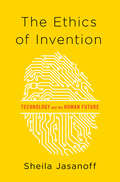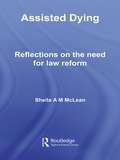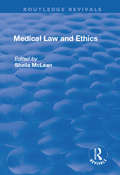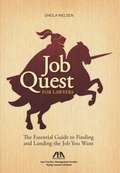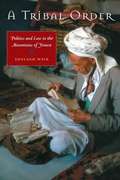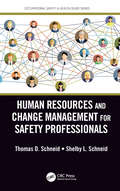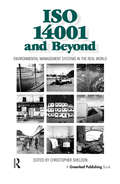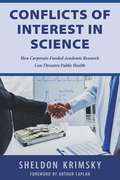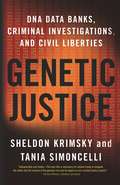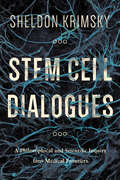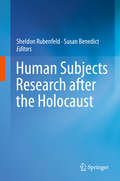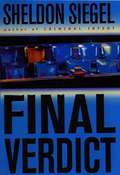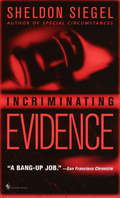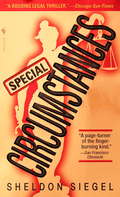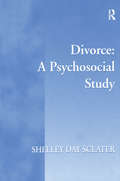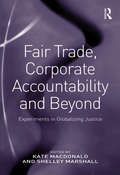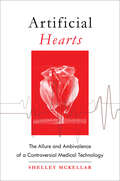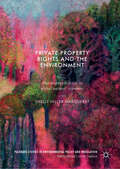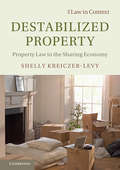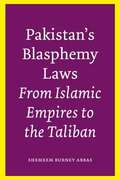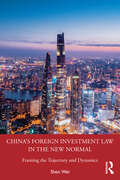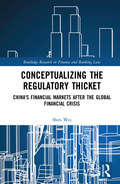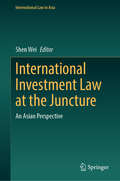- Table View
- List View
The Ethics of Invention: Technology and the Human Future
by Sheila JasanoffWe live in a world increasingly governed by technology--but to what end? Technology rules us as much as laws do. It shapes the legal, social, and ethical environments in which we act. Every time we cross a street, drive a car, or go to the doctor, we submit to the silent power of technology. Yet, much of the time, the influence of technology on our lives goes unchallenged by citizens and our elected representatives. In The Ethics of Invention, renowned scholar Sheila Jasanoff dissects the ways in which we delegate power to technological systems and asks how we might regain control. Our embrace of novel technological pathways, Jasanoff shows, leads to a complex interplay among technology, ethics, and human rights. Inventions like pesticides or GMOs can reduce hunger but can also cause unexpected harm to people and the environment. Often, as in the case of CFCs creating a hole in the ozone layer, it takes decades before we even realize that any damage has been done. Advances in biotechnology, from GMOs to gene editing, have given us tools to tinker with life itself, leading some to worry that human dignity and even human nature are under threat. But despite many reasons for caution, we continue to march heedlessly into ethically troubled waters. As Jasanoff ranges across these and other themes, she challenges the common assumption that technology is an apolitical and amoral force. Technology, she masterfully demonstrates, can warp the meaning of democracy and citizenship unless we carefully consider how to direct its power rather than let ourselves be shaped by it. The Ethics of Invention makes a bold argument for a future in which societies work together--in open, democratic dialogue--to debate not only the perils but even more the promises of technology.
Assisted Dying: Reflections on the Need for Law Reform (Biomedical Law and Ethics Library)
by Sheila McLeanAssisted Dying explores the law relating to euthanasia and assisted suicide, tracing its development from prohibition through to the laissez faire attitude adopted in a number of countries in the 21st Century. This book provides an in-depth critique of the arguments surrounding legislative control of such practices and particularly looks into the regulatory role of the state. In the classical tradition of libertarianism, the state is generally presumed to have a remit to intervene where an individual’s actions threaten another, rather than harm the individuals themselves. This arguably leaves a question mark over the state’s determined intervention, in the UK and elsewhere, into the private and highly personal choices of individuals to die rather than live. The perceived role of the state in safeguarding the moral values of the community and the need for third party involvement in assisted suicide and euthanasia could be thought to raise these practices to a different level. These considerations may be in direct conflict with the so called right to die espoused by some individuals and groups within the community. However this book will argue that the state’s interests are and should be second to the interests that the people themselves have in choosing their own death. Assisted Dying is winner of the The Minty Prize of the Society of Authors, and winner of the Royal Society of Medicine Book Awards, 2008
Medical Law and Ethics: Medical Ethics And Human Rights (Routledge Revivals)
by Sheila McLeanThis title was first published in 2002.The wide range of essays contained within this volume present contemporary thinking on the legal and ethical implications surrounding modern medical practice.
Job Quest for Lawyers: The Essential Guide to Finding and Landing the Job You Want
by Sheila NielsenThis book provides step-by-step guidance that finally makes networking inspiring instead of a chore. The "quest" motif applies to each stage of the job search. The book demystifies networking by including illustrations from the author's own experiences and from the stories of her clients that provide examples of the real world do's and don'ts of how to conduct a productive job search.
A Tribal Order: Politics and Law in the Mountains of Yemen
by Shelagh WeirA Tribal Order describes the politico-legal system of Jabal Razih, a remote massif in northern Yemen inhabited by farmers and traders.<P><P> Contrary to the popular image of Middle Eastern tribes as warlike, lawless, and invariably opposed to states, the tribes of Razih have stable structures of governance and elaborate laws and procedures for maintaining order and resolving conflicts with a minimum of physical violence. Razihi leaders also historically cooperated with states, provided the latter respected their customs, ideals, and interests. Weir considers this system in the context of the rugged environment and productive agricultural economy of Razih, and of centuries of continuous rule by Zaydi Muslim regimes and (latterly) the republican governments of Yemen.
Human Resources and Change Management for Safety Professionals (Occupational Safety & Health Guide Series)
by Thomas Schneid Shelby SchneidThe goal of this book is to prepare safety and health professionals to recognize and address human resource issues, applicable laws and regulations, as well as change management techniques used to alter the safety culture within their operations. This book will provide awareness to avoid or address HR related policies/issues/laws which can result in costly litigation, grievances, and other negative implications. The book will address the "pitfalls" for safety professionals to avoid as well as provide the methodology to attain the cultural change necessary to achieve and maintain safety performance. <P><P>Features <li>Prepares safety professionals how to avoid or address HR issues and laws <li>Provides awareness of applicable labor and employment laws and regulations <li>Covers change management skills applicable to the safety function <li>Enables the safety professional to recognize legal requirements from everyday questions asked by employees <li>Helps safety professionals to prevent becoming entangled in legal issues resulting from their actions or inactions
ISO 14001 and Beyond: Environmental Management Systems in the Real World
by Sheldon ChristopherOn September 1st 1996, ISO 14001 was published, worldwide. Written over five years in consultation with international industrial experts, non-governmental organizations and regulators, this environmental management systems standard will help organizations manage their impacts on the environment, no matter what their size, nature or location. The implications for the future are enormous. But what does the standard mean in the real world? What changes do managers have to make to accommodate its principles? What decisions need to be faced and when? Is it really going to make a difference or is it just another case of global greenwash? Will it be another missed opportunity for you, your organisation, or your market? At the start of what promises to be a worldwide explosion of interest in standardised EMSs, ISO 14001 and Beyond looks at their creation, their use, and their limitations, attempting to discover the essential truth about this important management tool and where it will take industry. ISO 14001 and Beyond assembles the leading thinkers and practitioners in the field to record their thoughts and experiences on the new standard, its advantages and disadvantages. The book is designed to provide the reader with enough information with which to form an opinion on the future, and how that will influence subsequent actions. It also provides reassurance that, although the problems are real, so are the solutions. ISO 14001 and Beyond gives you the opportunity to read what some of the best minds have made of the standard so far and what they think lies ahead. There are reports covering a global spectrum of concern: from the US, Russia, Japan, Canada, Germany, the UK, and more; from multinationals, small- and medium-sized enterprises, local government, universities and professional bodies. All this material is gathered together in one book to give you the best, most meaningful information for the crucial decisions that you will need to make in the coming months.
Conflicts of Interest In Science: How Corporate-Funded Academic Research Can Threaten Public Health
by Sheldon Krimsky30+ Years of Peer-Reviewed Studies on the Corporate Ties and Vested Interests that Influence Scientific ResearchFor over 500 years, groups and organizations with political, economic, and personal interests have successfully exercised influence on the pursuit of scientific inquiry and knowledge. History is replete with examples like the Papal authority muddying research into studies of the cosmos, but far less attention is paid today to the various corporate and special interest groups who, through funding and lobbying efforts, have been able to shape the modern academic and scientific landscape to fit their agenda.In Conflicts of Interest Within Science, author Sheldon Krimsky compiles 21 peer-reviewed, academic articles that examine the complex relationship between the individual scientists conducting research and the groups who fund them. Ultimately, Krimsky’s call to action concerns a collective movement among authors, peer reviewers, corporations and journal editors to disclose the sources of their funding. By holding scientists and the groups that fund them more accountable through increased transparency, we as a society can begin to rebuild trust in the integrity of knowledge.
Genetic Justice: DNA Data Banks, Criminal Investigations, and Civil Liberties
by Sheldon Krimsky Tania SimoncelliNational DNA databanks were initially established to catalogue the identities of violent criminals and sex offenders. However, since the mid-1990s, forensic DNA databanks have expanded in some states and nations to include all people who have been arrested, regardless of whether they've been charged or convicted of a crime. The public is largely unaware of these changes and the advances in biotechnology and forensic DNA science that have made them possible, but we are beginning to realize that the unfettered collection of DNA profiles from innocent citizens has compromised our basic freedoms and rights. Two prominent advisors on medical ethics, science policy, and civil liberties take a hard look at how the United States, Australia, Japan, and European countries have balanced the use of DNA databanks in criminal justice with the privacy rights of their citizenry. Sheldon Krimsky and Tania Simoncelli analyze the constitutional, ethical, and sociopolitical implications of expanded DNA collection in the United States and compare these findings to trends in other locations. They examine the development of legal precedent for taking DNA from juveniles, searching DNA databases for possible family members of suspects, conducting "DNA dragnets" of large local populations, and the warrantless acquisition by police of so-called abandoned DNA as they search for suspects. Most intriguing, Krimsky and Simoncelli explode the myth that DNA profiling is infallible, which has profound implications for criminal justice.
Genetic Justice: DNA Data Banks, Criminal Investigations, and Civil Liberties
by Sheldon Krimsky Tania SimoncelliNational DNA databanks were initially established to catalogue the identities of violent criminals and sex offenders. However, since the mid-1990s, forensic DNA databanks have in some cases expanded to include people merely arrested, regardless of whether they've been charged or convicted of a crime. The public is largely unaware of these changes and the advances that biotechnology and forensic DNA science have made possible. Yet many citizens are beginning to realize that the unfettered collection of DNA profiles might compromise our basic freedoms and rights.Two leading authors on medical ethics, science policy, and civil liberties take a hard look at how the United States has balanced the use of DNA technology, particularly the use of DNA databanks in criminal justice, with the privacy rights of its citizenry. Krimsky and Simoncelli analyze the constitutional, ethical, and sociopolitical implications of expanded DNA collection in the United States and compare these findings to trends in the United Kingdom, Japan, Australia, Germany, and Italy. They explore many controversial topics, including the legal precedent for taking DNA from juveniles, the search for possible family members of suspects in DNA databases, the launch of "DNA dragnets" among local populations, and the warrantless acquisition by police of so-called abandoned DNA in the search for suspects. Most intriguing, Krimsky and Simoncelli explode the myth that DNA profiling is infallible, which has profound implications for criminal justice.
Stem Cell Dialogues: A Philosophical and Scientific Inquiry Into Medical Frontiers
by Sheldon KrimskyStem cells and the emerging field of regenerative medicine are at the frontiers of modern medicine. These areas of scientific inquiry suggest that in the future, damaged tissue and organs might be repaired through personalized cell therapy as easily as the body repairs itself, revolutionizing the treatment of numerous diseases. Yet the use of stem cells is fraught with ethical and public policy dilemmas that challenge scientists, clinicians, the public health community, and people of good will everywhere. How shall we deal with these amazing biomedical advances, and how can we talk about potential breakthroughs with both moral and scientific intelligence? This book provides an innovative look at these vexing issues through a series of innovative Socratic dialogues that elucidate key scientific and ethical points in an approachable manner. Addressing the cultural and value issues underlying stem cell research while also educating readers about stem cells' biological function and medical applications, Stem Cell Dialogues features fictional characters engaging in compelling inquiry and debate. Participants investigate the scientific, political, and socioethical dimensions of stem cell science using actual language, analysis, and arguments taken from scientific, philosophical, and popular literature. Each dialogue centers on a specific, recognizable topic, such as the policies implemented by the George W. Bush administration restricting the use of embryonic stem cells; the potential role of stem cells in personalized medicine; the ethics of cloning; and the sale of eggs and embryos. Additionally, speakers debate the use of stem cells to treat paralysis, diabetes, stroke effects, macular degeneration, and cancer. Educational, entertaining, and rigorously researched (with 300 references to scientific literature), Stem Cell Dialogues should be included in any effort to help the public understand the science, ethics, and policy concerns of this promising field.
Human Subjects Research after the Holocaust
by Sheldon Rubenfeld Susan Benedict"An engaging, compelling and disturbing confrontation with evil . . . a book that will be transformative in its call for individual and collective moral responsibility. " - Michael A. Grodin, M. D. , Professor and Director, Project on Medicine and the Holocaust, Elie Wiesel Center for Judaic Studies, Boston University Human Subjects Research after the Holocaust challenges you to confront the misguided medical ethics of the Third Reich personally, and to apply the lessons learned to contemporary human subjects research. While it is comforting to believe that Nazi physicians, nurses, and bioscientists were either incompetent, mad, or few in number, they were, in fact, the best in the world at the time, and the vast majority participated in the government program of "applied biology. " They were not coerced to behave as they did--they enthusiastically exploited widely accepted eugenic theories to design horrendous medical experiments, gas chambers and euthanasia programs, which ultimately led to mass murder in the concentration camps. Americans provided financial support for their research, modeled their medical education and research after the Germans, and continued to perform unethical human subjects research even after the Nuremberg Doctors' Trial. The German Medical Association apologized in 2012 for the behavior of its physicians during the Third Reich. By examining the medical crimes of human subjects researchers during the Third Reich, you will naturally examine your own behavior and that of your colleagues, and perhaps ask yourself "If the best physicians and bioscientists of the early 20th century could do evil while believing they were doing good, can I be certain that I will never do the same?"
Final Verdict
by Sheldon SiegelFate throws a curveball at the San Francisco ex-husband-and-wife legal team of Mike Daley and Rosie Fernandez, when Mike picks up the phone and hears the voice of Leon Walker. This is not good news-because Walker was the one who ruined their marriage. Years ago, he and his brother participated in a stickup that left a man dead. Through a series of (some said) questionable maneuvers, Mike got the charges dropped, but he and Rosie fought about it all the time and it finally drove a wedge between them. Now, a Silicon Valley venture capitalist has been found dead in a dumpster on San Francisco's skid row. The new murder has been pinned on Walker, but he not only tells Mike he is innocent, he says he is a dying man and doesn't want to go to his grave proclaimed a murderer. Dogged investigation, courtroom nimbleness, and a healthy dose of luck usually have helped Mike before, but it looks like it'll take more than that to prevail this time, and his time is running out-both on his client and, just maybe, on his partnership. Filled with wonderful characters and suspense and more than a touch of humor, Reasonable Doubt is, like the author's first three books, a page-turner. S
Incriminating Evidence
by Sheldon SiegelWith his terrific first novel,Special Circumstances, Sheldon Siegel delivered legal fiction so exciting, it drew comparisons with the very top tier of courtroom thrillers. Now he has a new challenge for defense attorney Mike Daley--ex-priest, ex-husband, ex-public defender--and it's a high-profile zinger: a case he doesn't think he can win for a client he can't stand. It starts with a phone call Mike Daley never expected to get, from District Attorney Prentice Marshall Gates III, San Francisco's chief law enforcement officer and front-runner candidate for California attorney general. Friends they're not, but Gates needs Daley now--badly. He's just been arrested. A couple of hours earlier he woke up in his hotel room and found the dead body of a young male prostitute in the bed. Prosecutors are already talking the death penalty, and there's nothing in the mounting evidence to convince Daley and his partner--and ex-wife--Rosie of Gates's innocence. But even if he's lying, it's their job to defend him. Sure enough, the deeper Mike and Rosie dig, the seamier their findings. From a shady Internet entrepreneur who trades flesh for cash to a prominent businessman who uses muscle to keep his enterprise prospering, Mike and Rosie chase down leads that take them from the depths of the Mission District, where drugs and bodies are always for sale, to the gated mansions of Pacific Heights, frantically trying to piece together the shocking truth of what actually happened, even as the trial itself is under way.
Special Circumstances
by Sheldon SiegelIntroducing an electrifying new voice in legal fiction--in a phenomenal thriller unlike anything you've read before. . . Debut author Sheldon Siegel bursts into the legal arena with a riveting courtroom drama, exposing the world of big-time law firms and lawyers in a sharp-witted, wonderfully sardonic page-turner of a novel. Meet Mike Daley. Ex-priest. Ex-public defender. Ex-husband. And as of yesterday, ex-partner at Simpson & Gates, one of San Francisco's most prominent law firms. Today he's out on his own, setting up a private practice on the wrong side of town. Then his best friend and former colleague is charged with a brutal double murder. Daley has his first client--and is instantly catapulted into a high-profile case involving the prestigious law firm that just booted him. The victims are one of Simpson & Gates's most powerful partners and a beautiful young associate. There's a suicide note on the partner's computer, but neither the police nor the ambitious district attorney believe it's authentic--and they think the man they've arrested is the killer. It's up to Mike Daley to prove them wrong, but time is very short. As Daley prepares his case, he begins to uncover the firm's dirtiest secrets--and dirty they are--but he also discovers that his friend, too, has a lot to hide. Even as the trial is under way, Daley and his investigators are still frantically digging for evidence that will clear their client. Against a chorus of morning press reports and nightly TV commentaries picking apart each day's session, Daley comes to realize that ambition, politics, greed, and long-standing grudges will play just as important a role in the outcome as truth and justice. This is the real world of law practice at work, and it's as ruthless as it is startling. Brilliantly paced, witty, crackling with energy and suspense,Special Circumstancesnot only brings us to a stunning denouement; it zestfully reminds us why we love to hate lawyers--but can't get enough of courtroom drama when it's done this well. In a stunning turn of events, Daley's best friend, an ex-colleague, is charged with the double murder of two lawyers at the old firm and asks Daley to defend him. Cobbling together a defense team composed of himself, his ex-wife, and a onetime courtroom fixture named Mort Goldberg who's been wished on him against his better judgment, Daley finds he's got more to defend than his friend's innocence. The newly elected media-hungry District Attorn- ey, also a former colleague, will prosecute the case himself. As court is called into session, it becomes clear that in this trial ambition, honor, friendship, greed, and longstanding grudges will play as important a role as truth and justice. Rarely has a legal thriller debut so accurately depicted not only the inner workings of the legal system but the crack-ling energy it takes to build and defend a felony case. In SPECIAL CIRCUMSTANCES author Sheldon Siegel reminds us why we love to hate lawyers -- but can't get enough of courtroom drama when it's done this well. -->
Divorce: A Psychosocial Study
by Shelley Day SclaterSeveral jurisdictions have attempted to render divorce more harmonious by abolishing matrimonial 'fault' and facilitating the resolution of divorce disputes by mediation. In Britain, these provisions appear in the Family Law Act 1996. The book presents a challenge to the underlying assumptions that conflict and the adversarial system are undesirable. Its focus is on adults’ experiences of divorce. In a series of interviews, divorcing people told their own stories of divorce. The personal narratives revealed that divorce can be emotionally traumatic, but it has positive sides too. The emotions of divorce are not pathological , but are readily explicable as ordinary human coping strategies , in the context of the real material privations that many divorcing people suffer. These coping strategies often involve conflict and acrimony. From a psychodynamic perspective, it is argued that these are integral, and psychologically necessary, aspects of the divorce process. This book is particularly topical in the light of the recent decision of the British Government to postpone the implementation of the Family Law Act 1996 and the acknowledged need for research to inform policy.
Fair Trade, Corporate Accountability and Beyond: Experiments in Globalizing Justice
by Shelley MarshallAs trade and production have increasingly crossed international boundaries, private bodies and governments alike have sought new ways to regulate labour standards and advance goals of fairness and social justice. Governments are harnessing social and market forces to advance corporate accountability, while private bodies are employing techniques drawn from command and control regulation to shape the behaviour of business. This collection brings together the research and reflections of a diverse international mix of academics, activists and practitioners in the fields of fair trade and corporate accountability, representing perspectives from both the industrialized and developing worlds. Contributors provide detailed case studies of a range of social justice governance initiatives, documenting the evolution of established strategies of advocacy and social mobilization, and evaluating the strengths and limitations of voluntary initiatives compared with legally enforceable instruments.
Artificial Hearts: The Allure and Ambivalence of a Controversial Medical Technology
by Shelley McKellarA comprehensive history of the development of artificial hearts in the United States.Artificial hearts are seductive devices. Their promissory nature as a cure for heart failure aligned neatly with the twentieth-century American medical community’s view of the body as an entity of replacement parts. In Artificial Hearts, Shelley McKellar traces the controversial history of this imperfect technology beginning in the 1950s and leading up to the present day. McKellar profiles generations of researchers and devices as she traces the heart’s development and clinical use. She situates the events of Dr. Michael DeBakey and Dr. Denton Cooley’s professional fall-out after the first artificial heart implant case in 1969, as well as the 1982–83 Jarvik-7 heart implant case of Barney Clark, within a larger historical trajectory. She explores how some individuals—like former US Vice President Dick Cheney—affected the public profile of this technology by choosing to be implanted with artificial hearts. Finally, she explains the varied physical experiences, both negative and positive, of numerous artificial heart recipients. McKellar argues that desirability—rather than the feasibility or practicality of artificial hearts—drove the invention of the device. Technical challenges and unsettling clinical experiences produced an ambivalence toward its continued development by many researchers, clinicians, politicians, bioethicists, and the public. But the potential and promise of the artificial heart offset this ambivalence, influencing how success was characterized and by whom. Packed with larger-than-life characters—from dedicated and ardent scientists to feuding Texas surgeons and brave patients—this book is a fascinating case study that speaks to questions of expectations, limitations, and uncertainty in a high-technology medical world.
Private Property Rights and the Environment: Our Responsibilities to Global Natural Resources (Palgrave Studies in Environmental Policy and Regulation)
by Shelly Hiller MargueratThis book explores the current notion and definition of property, and its interpretation and implementation in relation to the environment. The author examines two primary problems: the degradation of land, natural resources and animal abuse; and the increasing erosion of private property rights from property owners by the arbitrary interference of state governments. Examining texts from antiquity to contemporary legislation, it portrays the historical development of the understanding of “nature” as “property” and discusses our obligations towards the environment. Drawing on the most influential political-philosophical texts from all periods of property rights history, the author analyzes modern national and international legislation and case law to offer legally-grounded evidence and explanations. This book advocates the incorporation of a formula that guarantees the protection of property rights into the legal system, and imposes clear and effective responsibility on property owners to limit the use of natural resources and the abuse of animals. This book will appeal to practitioners, researchers and students with an interest in environmental and private property law.
Destabilized Property: Property Law in the Sharing Economy (Law in Context)
by Shelly Kreiczer-LevyThe sharing economy challenges contemporary property law. Does the rise of access render our conception of property obsolete? What are the normative and theoretical implications of choosing casual short-term use of property over stable use? What are the relational and social complications of blurring the line between personal and commercial use of property? The book develops a novel conceptualization of property in the age of the sharing economy. It argues that the sharing economy pushes for a mobile and flexible vision of engaging with possessions and, as a result, with other people. Property's role as a source of permanence and a facilitator of stable, long-term relationships is gradually decreasing in importance. The book offers a broad theoretical and normative framework for understanding the changing landscape of property, provides an institutional analysis of the phenomenon, discusses the social, communal, and relational implications of these changes, and offers guidelines for law reform.
Pakistan's Blasphemy Laws: From Islamic Empires to the Taliban
by Shemeem Burney AbbasUnder the guise of Islamic law, the prophet Muhammad's Islam, and the Qur'an, states such as Pakistan, Afghanistan, Egypt, Saudi Arabia, and Bangladesh are using blasphemy laws to suppress freedom of speech. Yet the Prophet never tried or executed anyone for blasphemy, nor does the Qur'an authorize the practice. Asserting that blasphemy laws are neither Islamic nor Qur'anic, Shemeem Burney Abbas traces the evolution of these laws from the Islamic empires that followed the death of the Prophet Muhammad to the present-day Taliban. Her pathfinding study on the shari'a and gender demonstrates that Pakistan's blasphemy laws are the inventions of a military state that manipulates discourse in the name of Islam to exclude minorities, women, free thinkers, and even children from the rights of citizenship. Abbas herself was persecuted under Pakistan's blasphemy laws, so she writes from both personal experience and years of scholarly study. Her analysis exposes the questionable motives behind Pakistan's blasphemy laws, which were resurrected during General Zia-ul-Haq's regime of 1977-1988--motives that encompassed gaining geopolitical control of the region, including Afghanistan, in order to weaken the Soviet Union. Abbas argues that these laws created a state-sponsored "infidel" ideology that now affects global security as militant groups such as the Taliban justify violence against all "infidels" who do not subscribe to their interpretation of Islam. She builds a strong case for the suspension of Pakistan's blasphemy laws and for a return to the Prophet's peaceful vision of social justice.
China's Foreign Investment Law in the New Normal: Framing the Trajectory and Dynamics
by Shen WeiThis book analyzes China's foreign investment law which came into force in January 2020. The new law implemented sweeping changes and overhauled China’s foreign investment law regime of the last four decades. The foreign investment law aims to make the business environment more investor-friendly and address some of the contentious issues between US and China in the ongoing trade war. The book explains how the law enhances regulatory transparency. It also outlines the new approval process, that is the pre-establishment negative list system which has replaced the former approval system for foreign investment projects. This book will help give readers a better understanding of major changes and benefits under the new law and will be the first of its kind looking at the implications of this law.
Conceptualizing the Regulatory Thicket: China's Financial Markets after the Global Financial Crisis (Routledge Research in Finance and Banking Law)
by Shen WeiThis book examines the regulatory framework, regulatory objectives, regulatory logics, regulatory instruments, regulatory failures, and regulatory responses in China’s financial market after the global financial crisis. The book provides an in-depth analysis of China’s contemporary financial regulatory system, focusing on risks, regulation, and policies in practice. By drawing on public and private interest theories relating to financial regulation, the book contends that the controlled development of the banking sector, and the financial sector generally, has transformed China’s banks into more market-oriented institutions and increased public sector growth. However, China’s financial market and financial regulation have some inherent weaknesses and deficiencies. This book also offers insights into how this can be improved or adapted to minimize systemic risks in China’s financial sector. This book tries to prove that financial regulation is not just a vehicle for maintaining efficient financial markets but a primary tool through which the Chinese government achieves its political and economic objectives. More fundamentally, according to the law and finance theory, strong market and vibrant judicial systems are needed to further modernize China’s financial markets and market economy. The book will be a useful reference for anyone interested in learning from the Chinese experience.
Decoding Chinese Bilateral Investment Treaties
by Shen WeiThis is a major work investigating China's bilateral investment treaties (BITs) regime through various approaches including textual analysis, case study, comparative study and empirical study. This book tries to unveil some of the puzzles in Chinese BITs. The general consensus is that the evolution of China's BIT regime has its underlying logic, which follows an investment liberalization trend and fits China's changing role from a key capital-importing state to a major capital-exporting state. A similar trend is evident in Chinese BIT-making and BIT policy. This book investigates these theoretical assumptions and looks into some of the loopholes in Chinese BITs.
International Investment Law at the Juncture: An Asian Perspective (International Law in Asia)
by Shen WeiThe book focuses on some of the most pressing issues in international investment law in Asia, such as the role of developing countries, the rebalancing between the investors’ rights protection and the host states’ right to regulate, the ISDS reform, among others. The book investigates these issues by looking into the bilateral investment treaties and investment arbitration cases in the region. The readers will benefit from this book’s rich content and wide coverage. For instance, the readers would learn more about Asian states’ Bilateral Investment Treaty law and practice and their standing on international investment law. The book provides a fresh angle to most readers who may be more exposed to the Western perspective on the topic, providing a more complete picture to add to the readers’ understanding of international investment law and in particular its evolution and future possibilities.
